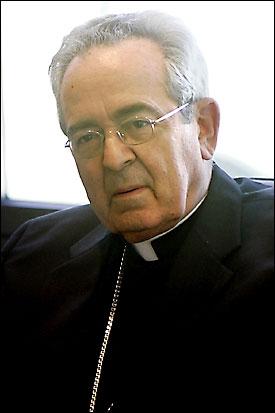By David O'Reilly
Philadelphia Inquirer
September 23, 2005
http://www.philly.com/mld/inquirer/news/front/12717577.htm
--------------------------------------------------------------------------------
Clearing the Record
A front-page article and headline ("Don't Read Report, Rigali says")
in today's Inquirer about Cardinal Justin Rigali's views of the grand
jury report on sexual abuse by priests incorrectly summarized his statements.
In response to a question, Cardinal Rigali said the report was "graphic,"
"slanted" and of questionable value to families, but made no
statement saying whether Catholics should read the report. Below is the
article with a corrected version of the first sentence.
--------------------------------------------------------------------------------
Cardinal Justin Rigali yesterday questioned the value to families of reading the district attorney's grand jury report, which accuses past leaders of the Philadelphia Archdiocese of covering up years of sexual abuse by priests.
Its "prolonged explanations of the abuse" are "very graphic," the Roman Catholic archbishop said in an interview at his Center City office yesterday.
The 418-page report, released Wednesday by District Attorney Lynne M. Abraham, also "gives a very slanted view" of how the archdiocese now handles sex-abuse cases, he said.
"I don't think it's of value to families," Rigali said.
 |
| Cardinal Justin Rigali in his office at the Philadelphia Archdiocese. Rigali admitted mistakes in the handling of abuse cases but said the intentions were not criminal. VICKI VALERIO / Inquirer Staff Photographer |
The report blasted former leaders of the archdiocese for allowing dozens of priests to abuse hundreds of children during the last 35 years.
It harshly rebuked Rigali's predecessors, Cardinals Anthony J. Bevilacqua and John Krol, for allegedly "burying" abuse reports, concealing crimes, and reassigning abuser priests to parishes where their sexual appetites were unknown. The report listed 63 known abusers who served in the archdiocese.
"The archdiocese acknowledges and completely repents mistakes made in the handling of some cases," Rigali said. He declined to discuss specific examples.
"But what we cannot accept is the inference that there was any intentional unlawful or criminal behavior on the part of officials of the archdiocese.
"Mistakes are one thing," he said. "Intentions are another."
The grand jurors, in their report, stated they had hoped to bring criminal charges against some archdiocesan officials but were stymied by Pennsylvania's statute of limitations on the crimes the jury believed were committed.
In the interview yesterday, Rigali continued his attempts to mitigate the impact of the scathing report.
The day the report was issued, the cardinal held a news conference to challenge its findings. He has prepared a letter discussing the grand jury report that will be read or circulated Sunday at all of the archdiocese's 274 parishes.
With the great copper dome of the Cathedral Basilica of SS. Peter and Paul looming beyond his window, Rigali - who succeeded Bevilacqua in 2003 - began the half-hour interview by repeating criticisms of the report he made at a Wednesday news conference:
"We find it a shame that the great efforts by the archdiocese" to prevent further sex abuse "were not touched upon or publicized" in the report, he said, glancing occasionally at notes.
He said that since 2002, the archdiocese had:
Made it a policy to permanently remove any priest who ever abused a minor.
Appointed a review board to advise the archbishop of sexual-abuse matters.
Trained 40,000 adults, including priests, teachers, coaches and volunteers, who work in the archdiocese about its rules for interacting with minors.
Educated more than 110,000 grammar school and high school youngsters about safe relationships with adults.
Appointed victim-assistance coordinators to reach out to persons abused by clergy.
"We are convinced these initiatives are beneficial to the whole community," Rigali said. He added that the archdiocese welcomed inquiries from any other institution or denomination wishing to study its policies and programs.
He denied Abraham's assertions that the archdiocese had "obstructed the grand jury's investigation at every turn" but acknowledged that he did not know all that might have happened before he became archbishop here.
"I arrived in October of 2003; the grand jury began in May 2002. But when I arrived, people were doing everything the grand jury required... . The attitude I saw was full cooperation," he said.
He said he never instructed the archdiocese's lawyers to hinder the investigation.
Rigali indicated he had read some of the grand jury report, which the archdiocese retrieved online Wednesday.
The archbishop, who served in the Vatican's diplomatic corps for three decades, remained noncommittal on whether he would endorse the grand jury's proposals for certain legislative changes, which include abolishing the statute of limitations for sexual abuse of children. He said they demanded careful study "and a great deal of legal wisdom."
He indicated, however, that while he was open to the idea of ending the statute of limitations on future sex crimes against minors, he did not favor a retroactive lifting of the statute for past crimes.
He also deflected a question about reports that Pope Benedict XVI was preparing to issue an edict barring the ordination of homosexually oriented men. "In due time, the position of the Holy See will be made public," he said.
Rigali apologized repeatedly throughout the interview to the victims of abuse, who he said he hoped would "come to reconciliation and peace" with the church.
He acknowledged that the crimes of "a small percentage of priests" and the hierarchy's mishandling of some of those priests had caused a scandal that might turn some Catholics away from the church forever.
"Terrible things have happened," he said, "but the community of God's people is sound." Most practicing Catholics, he said, remain devoted to their "faithful and generous" parish priests.
"We are deeply sorrowful," Rigali said at the close of the
interview. "We are learning from our mistakes."
--------------------------------------------------------------------------------
Contact staff writer David O'Reilly at 215-854-5723 or doreilly@phillynews.com.
Any original material on these pages is copyright © BishopAccountability.org 2004. Reproduce freely with attribution.